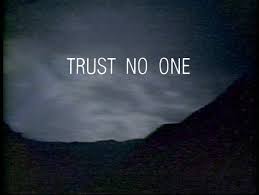This is an annotation. It is not an edit. I am aware that art often changes: buildings and paintings fade, performance becomes a mist in memory, history smudges the drawings and creations of mankind. Even text, in its ancient persistence, is erased by decomposition, re-transcription, and fires; art is erased and created by the same species which documents and destroys.
But the Internet seems to stare this rule in the face and oppose it. Information is ensured here; art is maintained; the Internet protects our creations from fading. The Internet leaves a trail which can be hard to completely reverse. In its most basic sense, this trail is a curse. People are embarrassed, hurt and destroyed by this trail because it documents failure and shame.
However, the trail is something we can look to in awe. It is a documentation of documentation, showing the art which inspires art. The Internet represents every user's own growth. It swells, lives, and connects; it is a fun-house mirror in which we can view ourselves, or step to the side and view others. It is the overlord of genres, the nebulous of infinite space where all forms of art can be admired through its haze.
I intend to use this nouveau paper trail to its fullest abilities and I declare henceforth that all entries, once posted under full faculty and operation of my mind and body, and devoid of silly or amateur grammatical mistakes, will remain. I, the learning dilettante, am bound to make such mistakes, but they will be limited and inconsequential. The substance of the post, the essence of art and its progress, will always remain. Humans change and their views and preferences change. People often cringe when viewing the traces of previous instances. But I will not hide the evidence of development, no matter the cringing involved. The me of the future will deal with such changes in prose palinodes. Recantation does not imply desecration. I will not deface art, as did the maddened men in history. That is why this is not an edit. It is an annotation.
As I recreate my birth into the new world of the web, I must speak again about myself. I was born into the first new world to the faces of an unusual amount of family: mother, father, great-grandmother and father, grandmother and father, and brother (all of which were surprisingly satisfied with being present for my birth at some ridiculous hour of the night). This congregation perhaps foreshadows my family's involvement in my life.
In the first month of the springtime of my life, I was athletic and never still. Then I donned glasses, and became academic. Since then, both modes of life I have enthusiastically pursued, but have been more unsuccessful in the pursuit of athleticism due to a lack of good coordination. Otherwise, the pursuits of the mind are fairly well fulfilled.
But I always seek to learn more and discover truth, unsatisfied.
Let me end by saying that "composition" is the best way to broadly term "creation", and is perhaps my favorite term. Besides its emphasis on the parts involved in the making of things, it connotes musical images. I think maybe I can understand the old and beautiful things, like a piece of classical music or an ancient Anglo-Saxon text. I feel that, in taking a composition class, I can investigate the beginnings of creation, the particles of art, and the transmutation of ideas and forms.
Thank you to whoever reads this for suffering through the incomplete and inadequate description of myself, who must remain anonymous, yet be compelling. Thank you to the creators who and creations which have recently affected and influenced me (
here,
here,
here,
here,
here, and
here).
In
Mike Milosh's words, "...time...time is...time is tight".



